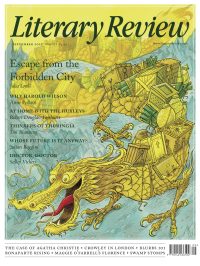Michael Bloch
Flirting with the Führer
Coffee with Hitler: The British Amateurs Who Tried to Civilise the Nazis
By Charles Spicer
Oneworld 400pp £20
This book tells the story of three Germanophile Englishmen who, during the 1930s, tried to foster ‘understanding’ between Britain and Nazi Germany with a view to averting another war. They were the businessman Ernest Tennant, the academic Philip Conwell-Evans and the aviator Grahame Christie. In character and background they could not have been more different. Tennant was the Old Etonian scion of a rich and famous family, Conwell-Evans a lower-middle-class Welshman, Christie a swashbuckler out of the pages of a Buchan novel. Tennant and Christie had served (traumatically in Tennant’s case, heroically in Christie’s) in the First World War; Conwell-Evans was a pacifist who had avoided military service (though we are not told whether this was because he was unfit – he certainly sounds physically unimpressive – or a ‘conchie’). But they all loved Germany, which they frequently visited, and spoke its language fluently.
When the Nazis took power, they recognised that this heralded a national revival, which they hoped would result in friendship with rather than enmity towards Britain. They believed they could contribute to such an outcome through their close relations with important figures in the new regime. Tennant and Conwell-Evans became pals of Ribbentrop, Hitler’s diplomatic adviser, who was appointed ambassador to the UK in 1936 and foreign minister in 1938; Christie became an intimate of his fellow aviator Göring, head of the Luftwaffe and eventually Hitler’s designated successor. Perhaps their greatest coup occurred in 1936, when Conwell-Evans brought Lloyd George to meet Hitler and Ribbentrop in Bavaria. The ex-premier and the dictator got on splendidly, which seemed to augur well for Anglo-German amity.
All three were closely involved in the Anglo-German Fellowship, launched in 1935: Tennant was one of the founders while Conwell-Evans became the political secretary. Previous historians have depicted this as a Nazi front organisation, but Spicer persuasively argues that this was not really the case. It was set

Sign Up to our newsletter
Receive free articles, highlights from the archive, news, details of prizes, and much more.@Lit_Review
Follow Literary Review on Twitter
Twitter Feed
Alfred, Lord Tennyson is practically a byword for old-fashioned Victorian grandeur, rarely pictured without a cravat and a serious beard.
Seamus Perry tries to picture him as a younger man.
Seamus Perry - Before the Beard
Seamus Perry: Before the Beard - The Boundless Deep: Young Tennyson, Science, and the Crisis of Belief by Richard Holmes
literaryreview.co.uk
Novelist Muriel Spark had a tongue that could produce both sugar and poison. It’s no surprise, then, that her letters make for a brilliant read.
@claire_harman considers some of the most entertaining.
Claire Harman - Fighting Words
Claire Harman: Fighting Words - The Letters of Muriel Spark, Volume 1: 1944-1963 by Dan Gunn
literaryreview.co.uk
Of all the articles I’ve published in recent years, this is *by far* my favourite.
✍️ On childhood, memory, and the sea - for @Lit_Review :
https://literaryreview.co.uk/flotsam-and-jetsam